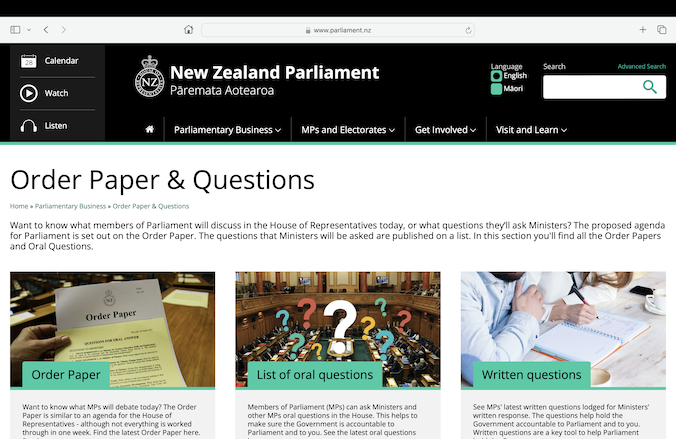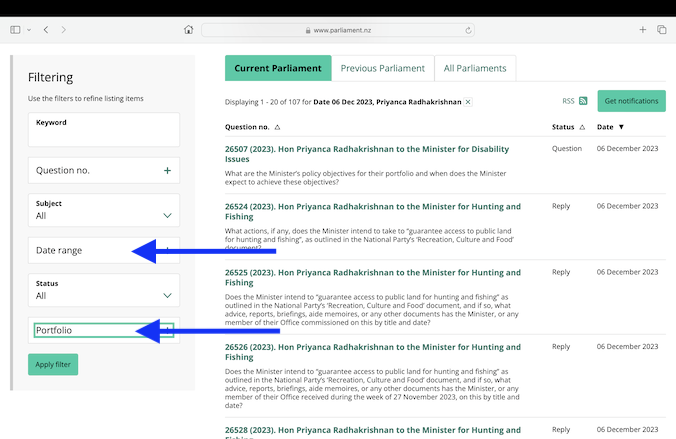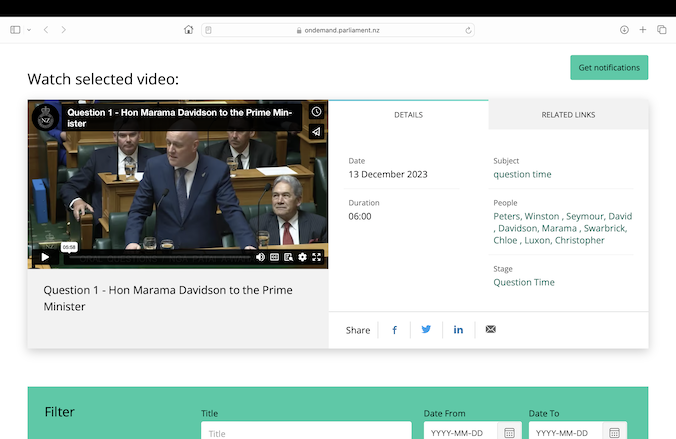Insider’s guide to NZ government (on-demand)
Session 3: Resources
The list below gives you access to a number of the source documents we looked at when examining Parliamentary Questions.
(1) Session 3 slides
Send us an email If you’d like a copy of the slides for session 3.
(2) Parliament - Parliamentary Questions
This link takes you to Parliament’s Order Paper and Questions. Here you can find all the latest written and oral questions asked to ministers.
(3) Written Questions - Priyanca Radhakrishnan
We looked at how MPs from opposition parties use ‘written questions’ as a way of gaining access to information from ministers and government agencies (i.e. the executive branch). And that they can sometimes ask a lot! Repeat, a lot! We looked at the fairly typical example of Priyanca Radhakrishnan (Labour party) on 6 December. If you’d like to take a look at the written questions she actually asked on that day, click here, then on the left hand side filter by date (“6 December 2023”), and also filter by portfolio (“Priyanca Radhakrishnan”).
(4) Oral Questions - 13 December 2023
(5) Oral Question - Marama Davidson to the Prime Minister
…and here’s the video showing Question 1 to the Prime Minister, asked by Hon Marama Davidson. Ft guest appearances from Chlöe Swarbrick, David Seymour and Winston Peters.
(6) FAQs
The Speaker kind of seems like the referee in a game of rugby?
Yes, exactly right.
The Speaker is actually an MP, i.e. one of the (normally) 120 MPs. They are chosen by the House to manage the affairs of the House in a neutral way, i.e. without favouring the government or opposition parties. So even though they’re actually from a parliamentary party they can’t favour either side. For example, the current Speaker is the Rt Hon Gerry Brownlee who is a National party MP.
Oddly enough, despite the Speaker being a neutral umpire, their vote is still added to the tally of votes from his or her own party. For instance, Speaker Brownlee’s 1 vote is included in the 49 votes the National party casts for or against laws in the House.
By tradition, the Speaker comes from the largest government party in Parliament - hence Speaker Brownlee is from the National Party.
Is there a limit to the number of supplementary questions an MP can ask?
The total number of supplementary questions asked each Question Time is capped. Each party is allocated a certain number of supplementary questions.
How a party uses its allocation of supplementary questions is really up to that party. It’s quite common, for example, for the Leader of the Opposition (currently Chris Hipkins, Labour) to use up quite a few supplementary questions after the primary questions they themselves ask. This is done to draw attention to the issues they’re focussed on as party leader. Of course, this leaves fewer supplementary question slots for the party to use on later questions, but that’s the trade-off.
The previous Speaker, Trevor Mallard, introduced a system whereby he deducted supplementary questions from a party’s allocation as a way of punishing MPs who (in his view) did not follow procedural rules (mentioned in this article).
I’m a bit lost on the ‘patsy’ vote thing?
A ‘patsy’ vote is a primary question asked by a member of one of the government parties (National, ACT, or NZ First) to a minister from the same party.
The question is friendly in nature, i.e. it’s designed to allow the minister to share ‘good news’ with the House in their respective portfolio. For example, if the number of people unemployed has decreased, the Minister of Finance might arrange in advance for a backbench MP in their party to ask a ‘patsy’ primary question like: ‘Has the Minister seen any reports on the state of the economy?”. The minister replies: “Why yes, it just so happens that I saw a report from Treasury yesterday showing that the economy is performing strongly and that the unemployment rate now sits below 4%….". Think of it as a verbal press release delivered with a theatrical performance from a minister that would make Shakespeare proud.
To be clear, the questions asked by Labour, Greens, and Te Pāti Māori are not ‘patsies’. They are hostile in nature. Question Time is a key tool in the opposition armoury - it provides an opportunity to show inconsistencies, poor performance by the government, and failure to deliver on promises - all with the press gallery looking down from above (when they aren’t busy scratching their names into the wooden table).
Sergeant at Arms. Ex-military?
Ha! No, the Serjeant-at-arms is just an ordinary public servant who works for Parliament. Their most visible role is carrying in the golden mace each time the House starts on a sitting day (walking ahead of the Speaker). But it turns out there’s lots more to the role - check it here.




